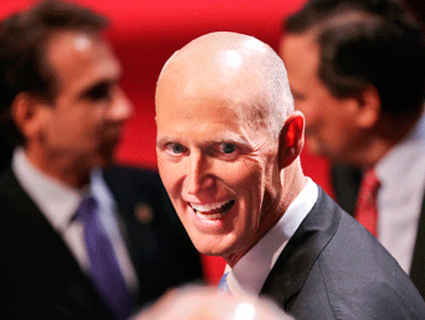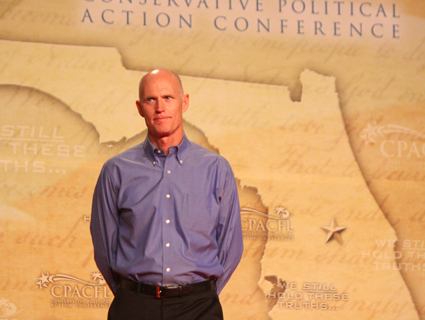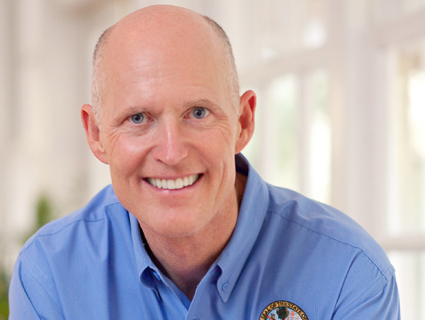
Richard Graulich/The Palm Beach Post/ZUMAPress
Florida Gov. Rick Scott (R) was in Washington, DC on Monday to make a deal. Florida, along with a handful of other Republican-run states, is still trying to wage war against Obamacare by refusing to take the generous expansion of Medicaid provided for in the new law. The expansion would provide government insurance to around a million poor and lower-middle-class Floridians, and the federal government has promised to foot almost all of the bill.
Last June, after the Supreme Court decision making the Medicaid expansion optional for the states, Scott said he won’t take the money. But when Florida hospitals realized Scott’s decision could cost them about $650 million a year in other federal payments, they started lobbying furiously to get him to change his mind. So now, after two years suing, demonizing and otherwise attacking President Barack Obama and the Democrats’ health care bill, Scott wants to negotiate. He came to Washington saying that he’d like to “work with the administration to reduce the cost of health care.” But that doesn’t mean he’s changed his mind.
Instead, what Scott wants from Kathleen Sebelius, Obama’s secretary of health and human services, is something that might actually make Florida’s dismal insurance situation—nearly 4 million Floridians are uninsured—even worse. Scott wants the Sebelius to give him official permission, called a waiver, to hand over the entire existing Medicaid program to private managed care companies. Don’t count on that happening.
Here’s why. Florida already has a small pilot project approved by George W. Bush’s administration that shunts Medicaid participants into HMO-type organizations. Scott has hailed this as a genius innovation that keeps costs down. But a close look at the program reveals no such miracles. A study by the Georgetown University Health Policy Institute concluded that there was no evidence the pilot project was saving money—and even if it was, any savings could have been from denying people needed care. (Anecdotal reports suggested that was the case.)
The Georgetown group also found that it would be all but impossible to make Medicaid more efficient, especially compared with private insurance. Between 2007 and 2012, private sector family insurance premiums rose more than 31 percent, but Florida’s per-person Medicaid costs actually fell by five percent. And the idea that Rick Scott is giving the federal government tips on making health care more efficient is interesting given that when he ran his own health care company, Columbia/HCA, it was systematically bilking the federal government of millions of dollars in what turned out to be the biggest health care fraud case the US has ever prosecuted.
So maybe it’s not surprising that the Obama administration has so far refused to allow Scott to expand the Medicaid pilot project, much less add another million people to it. And that’s not all Scott wants: He’s also asked Sebelius to allow Florida to charge all Medicaid patients unprecedented co-pays, such as $100 for emergency room visits not deemed an emergency, plus $10 monthly premiums. The Georgetown Health Policy Institute concluded that such a change would prompt about 800,000 poor parents and children to leave the program, an outcome that flies in the face of the administration’s goal of extending Medicaid in the first place. After Monday’s meeting with Sebelius, Scott said he was optimistic that he’d get what he wanted, or at least another meeting. Given his track record, he probably shouldn’t hold his breath.












